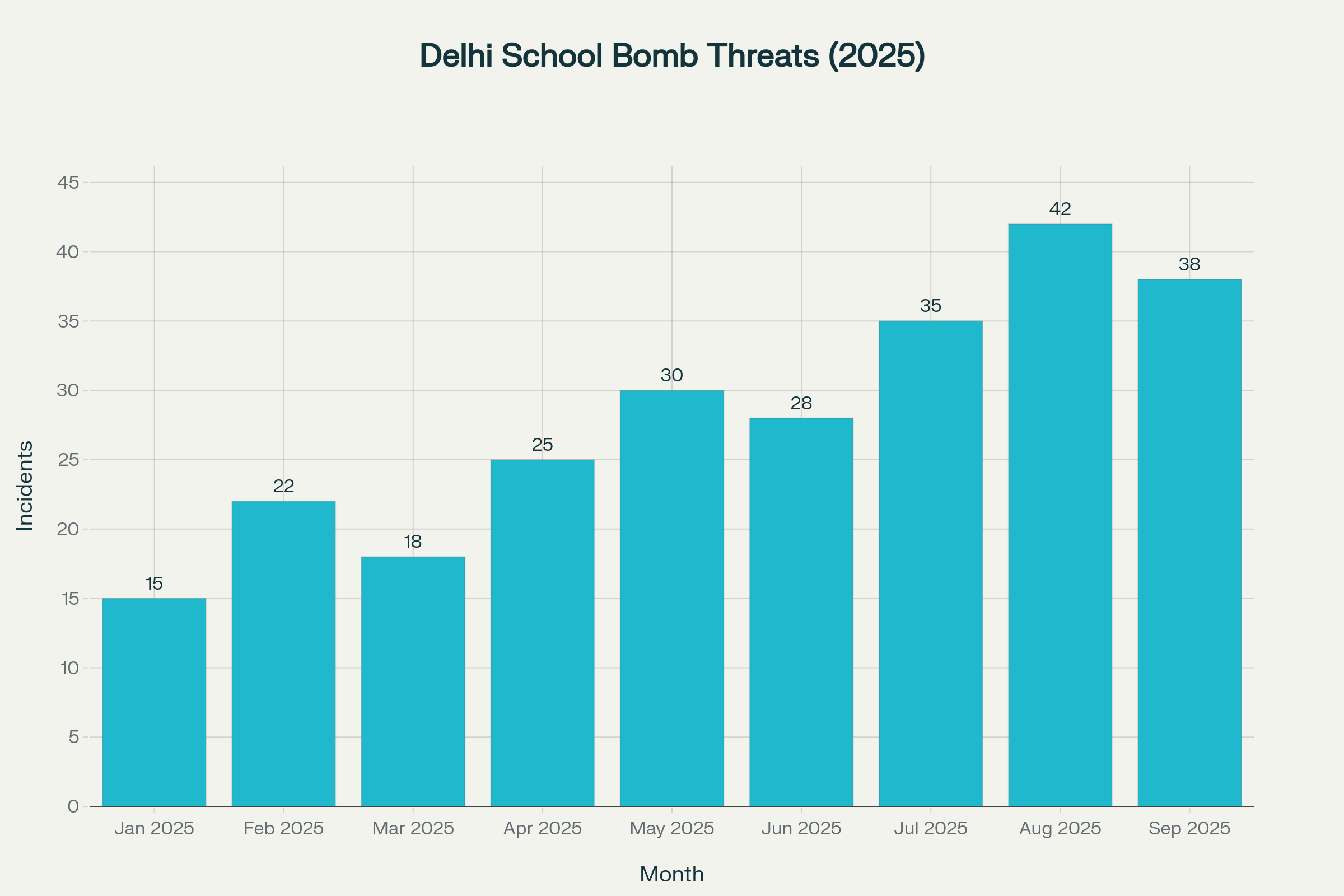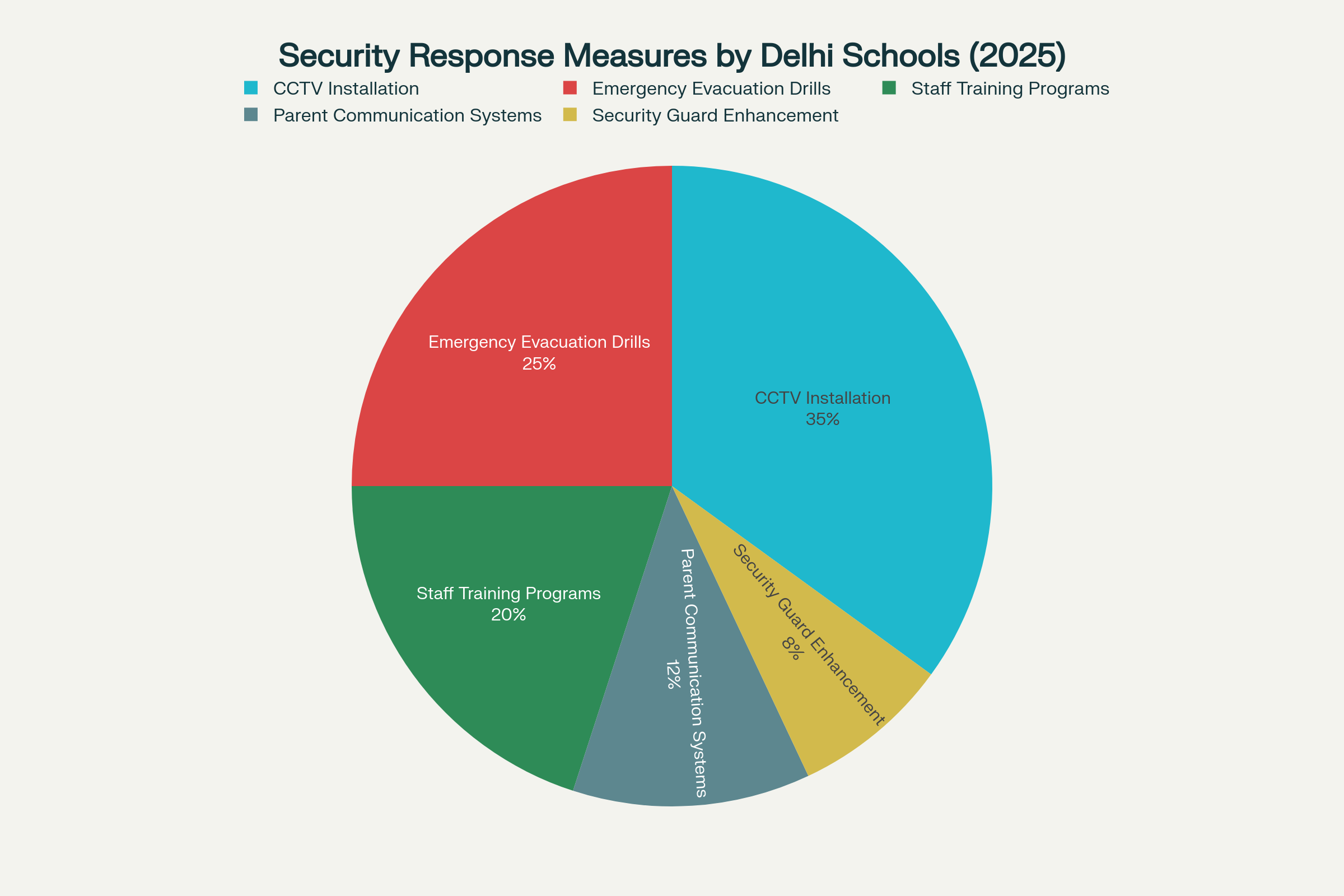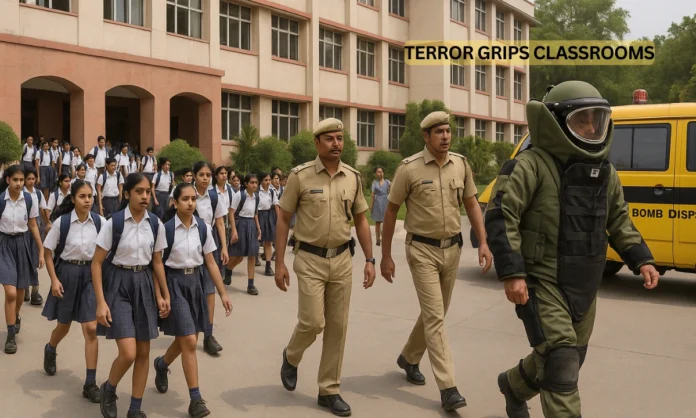Key Highlights
- Multiple Delhi schools including DPS Dwarka, Krishna Model Public School and Sarvodaya Vidyalaya received bomb threats on September 20, 2025, forcing immediate evacuations
- Over 200 schools across Delhi-NCR have faced similar hoax threats since January 2025, marking an unprecedented wave of security disruptions
- Delhi government has implemented comprehensive Standard Operating Procedures requiring monthly safety audits, CCTV installations and evacuation protocols
Opening Overview
Delhi school bomb threats have reached alarming frequency, with several prominent educational institutions receiving threatening calls on September 20, 2025, disrupting classes and postponing examinations across the capital. The morning threats targeted Delhi Public School Dwarka, Krishna Model Public School and Sarvodaya Vidyalaya, prompting swift evacuations as bomb disposal squads and police teams conducted thorough security sweeps.
These latest Delhi school bomb threats represent part of a disturbing pattern affecting the national capital throughout 2025, with authorities reporting over 150 hoax incidents targeting educational institutions since January. The repeated nature of Delhi school bomb threats has forced administrators to implement stringent safety protocols while parents grapple with mounting concerns about their children’s security during school hours.
Delhi School Bomb Threats: Crisis Response and Immediate Impact
- Delhi Police deployed bomb disposal units, fire services and dog squads to affected campuses within minutes of receiving threat reports
- DPS Dwarka announced complete school closure and postponement of mid-term examinations scheduled for Saturday
Delhi school bomb threats triggered immediate emergency protocols as authorities treated each report with maximum seriousness despite the likelihood of hoax origins. The Delhi Fire Department received the first alert from a Najafgarh area school at 6:30 AM, prompting coordinated responses from multiple agencies across affected locations. Emergency teams conducted comprehensive searches using specialized equipment and trained personnel, though no explosive devices were discovered at any targeted institution.
The disruption extended beyond immediate safety concerns, with DPS Dwarka informing parents through official circulars about school closure due to “unavoidable circumstances”. Mid-term examinations scheduled for Saturday were postponed indefinitely, affecting hundreds of students preparing for academic assessments. Transportation systems including school buses and private vehicles were immediately redirected, requiring parents to collect children from designated pickup points as evacuation procedures commenced.
Schools implemented established emergency protocols developed following Delhi High Court directives, ensuring systematic evacuations while maintaining communication with parents and authorities. The coordinated response demonstrated the effectiveness of recent safety training programs, though the psychological impact on students and staff remained significant.
Delhi School Bomb Threats: Pattern of Escalating Threats
- Delhi-NCR has witnessed over 200 hoax bomb threats targeting schools since January 2025
- Previous major incidents included 30 schools receiving threats on December 13, 2024, and 45 schools targeted in July 2025

Monthly escalation of bomb threat incidents targeting Delhi schools throughout 2025, showing significant increase from January to September
The frequency of Delhi school bomb threats has intensified dramatically throughout 2025, establishing a troubling pattern that extends beyond educational institutions. Official data indicates approximately 200 to 250 false bomb threat communications have targeted Delhi-NCR schools between November 2024 and July 2025. These incidents have encompassed various delivery methods including email campaigns, phone calls and social media platforms, demonstrating evolving tactics among perpetrators.
Recent major episodes illustrate the scope of disruption, with 32 schools receiving coordinated email threats on August 18, 2025, followed by 60 additional institutions targeted just two days later. The threats often include financial demands, with some emails requesting cryptocurrency payments of $5,000 within 72-hour deadlines. Investigation challenges persist as perpetrators employ sophisticated methods including darknet communications, proxy servers and international email domains to mask their identities.
Law enforcement agencies have identified several cases involving students as perpetrators, including instances where children sent threats to postpone examinations they felt unprepared to take. Delhi Police revealed that bomb threats to two Rohini schools originated from students within the institutions themselves, highlighting the complex motivations behind these disruptive acts.
Delhi School Bomb Threats: Government Response and Security Measures
- Delhi government implemented comprehensive Standard Operating Procedures requiring monthly safety reports, CCTV installations and specialized evacuation plans
- New protocols mandate formation of school safety committees and coordination with emergency services including Delhi Police and fire departments

Distribution of security measures implemented by Delhi schools following repeated bomb threat incidents in 2025
The Delhi government responded to escalating Delhi school bomb threats by establishing comprehensive security frameworks designed to enhance preparedness and response capabilities. The Directorate of Education rolled out mandatory Standard Operating Procedures following Delhi High Court directives, requiring all educational institutions to implement four-tier strategies focusing on prevention, preparedness, response and recovery. These measures apply universally to government, private, government-aided and minority-run educational institutions across the capital territory.
Monthly safety audits represent a cornerstone of the new security architecture, with schools required to submit detailed checklists documenting emergency preparedness to district authorities. CCTV camera installations have become mandatory alongside updated building layouts and secure perimeter maintenance to assist police and fire personnel during threat assessments. The protocols specifically address children with special needs, mandating separate evacuation plans ensuring no student remains behind during emergency situations.
School safety committees must oversee routine mock drills and maintain emergency equipment while coordinating evacuation routes with local authorities. Staff training programs and parent awareness campaigns form integral components of the comprehensive approach, preparing entire school communities for potential emergency scenarios. The government’s response acknowledges the psychological impact on students while balancing security needs with educational continuity requirements.
Investigation Challenges and Legal Framework
- Investigators face significant obstacles tracing threats routed through international servers and darknet platforms
- Legal penalties for bomb hoax perpetrators include imprisonment up to seven years under Indian Penal Code provisions
Delhi school bomb threats present complex investigative challenges as perpetrators increasingly employ sophisticated methods to evade detection and prosecution. Law enforcement agencies identify four primary techniques used to mask sender identities, ranging from cooperative global service providers to deliberately uncooperative international platforms requiring lengthy mutual legal assistance treaties. The darknet and dark web communications remain virtually impossible to trace, while proxy servers and virtual private networks effectively disguise perpetrator locations.
Successful investigations have revealed concerning patterns, including the identification of a 12th-grade student responsible for multiple hoax emails between February 2024 and January 2025. This individual claimed to have sent threatening communications as a “joke,” illustrating the disconnect between perpetrator motivations and serious consequences of their actions. Another case involved a 12-year-old student whose threat prompted police counseling rather than criminal prosecution due to the minor’s age.
International routing complicates investigation efforts, with some threats traced to servers in Hungary and Russia, making source identification extremely challenging. Despite these obstacles, Delhi Police maintain that every threat receives full investigative attention regardless of probable hoax status, as authorities cannot risk lives by assuming communications are false. The legal framework provides severe penalties for bomb hoax perpetrators, including potential imprisonment up to seven years under relevant Indian Penal Code provisions.
Delhi School Bomb Threats: Final Assessment
The surge in Delhi school bomb threats represents a critical challenge to educational security and community well-being, requiring sustained coordination between government agencies, educational institutions and law enforcement. While comprehensive security protocols and investigative efforts demonstrate official commitment to addressing these threats, the psychological impact on students, parents and educators continues mounting with each incident. The pattern of repeated disruptions affecting over 200 educational institutions since January 2025 underscores the urgent need for enhanced prevention strategies alongside improved response capabilities.
Effective resolution of Delhi school bomb threats demands continued evolution of security measures, investigative techniques and community awareness programs to protect educational environments while maintaining academic continuity. The government’s proactive approach through standardized operating procedures and mandatory safety audits provides a foundation for long-term security enhancement, though ongoing vigilance remains essential as threat tactics continue evolving.


